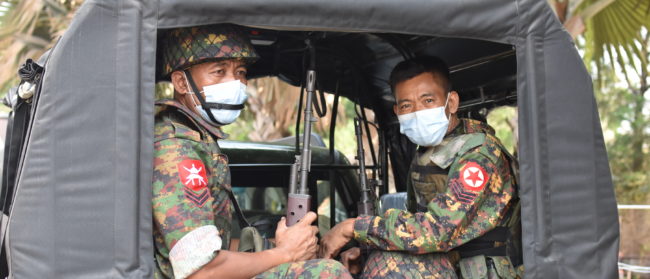President Joe Biden released the US’s Interim National Security Strategic Guidance (INSSG) on March 3. While the newly-released INSSG highlighted several strategic policies the new axdministration will focus on for the next four years, recalibrating and strengthening the US security alliance in Europe and Asia stood out as one of the most important priorities.
The US, according to the INSSG, will “reaffirm, invest in, and modernize the North Atlantic Treaty Organization (NATO) and our alliances with Australia, Japan, and the Republic of Korea.” In addition to security allies, the US is committed to deepening strategic partnership with India, New Zealand, Singapore, Vietnam, and the Association of Southeast Asian Nations (ASEAN).
However, there is something missing. While ASEAN as a whole is referenced, the 24-page long INSSG did not mention Thailand and the Philippines even once.
Since the US has been committed to strengthening the international order in the Indo-Pacific, where the Southeast Asia region plays a critical role in linking the Pacific and the Indian Oceans, why did the US omit its Southeast Asian security allies?
Geopolitics determines foreign policy. Biden’s administration is no different, with it committed to coming back to Asia post-Trump and reinvigorating US policy to Southeast Asia high on its agenda. The omission of Thailand and the Philippines has nothing to do with democracy deterioration and human rights violations in Thailand and the Philippines. Even though promoting democracy, human rights and freedom has been one of the flagships of US foreign policy, it is not the case in the Southeast Asia region, where its economic and security interests outweigh these values.
Vietnam, for instance, has maintained notorious records of systematic human rights abuses and suppression for decades. US-Vietnam relations, particularly security relations, however, have become much stronger over the last ten years. The US and Vietnam signed a Comprehensive Partnership agreement in July 2013 to bolster bilateral diplomatic relations and cooperation in maritime security, economic engagement, education and climate change. More importantly, the Obama’s administration fully lifted decades-long embargo on the sales of arms to Vietnam in 2016.
Besides frequent exchange visits by senior defence officials between the two countries, the US aircraft carrier USS Carl Vinson also made a historical port call in Vietnam in March 2018. The visit by the USS Carl Vinson clearly demonstrated another remarkable turning point of defence ties between the US and Vietnam since diplomatic normalisation in 1995. Moreover, on March 9, 2020, while the Covid-19 pandemic was hitting hard globally, the US Navy still sent its aircraft carrier USS Theodore Roosevelt and its escort ships to pay a five-day visit to Vietnam.
The US-Thailand security alliance and the US-Philippines security alliance have become intoxicated by the growing mutual strategic mistrust over the last few years
Considering this readiness to partner with Vietnam, the ongoing deterioration of democracy and human rights abuses in Thailand and the Philippines are unlikely the real reason why the US excluded the two countries from its INSSG.
The US-Thailand security alliance and the US-Philippines security alliance have become soured by the growing mutual strategic mistrust over the last few years. Both Thailand and the Philippines have been actively hedging against the US by leaning towards China in exchange for diplomatic and economic interests. With Chinese diplomatic and economic support, Thailand and the Philippines are able to increase their bargaining power to negotiate with the US.
Philippine president Rodrigo Duterte, for instance, has threatened to terminate the Visiting Force Agreement (VFA) – the military agreement between the US and the Philippines allowing the US military to have access to bases – several times. Each time Duterte set a different condition for doing so. In January 2020, Duterte threatened to terminate the VFA to protest against the US’ decision to deny entry visas for the former police chief Ronaldo dela Rosa, who is now a senator.
In December 2020, Duterte threatened to end the VFA if the US failed to deliver Covid-19 vaccines. Yet again, in February 2021, Duterte threatened to terminate the VFA if the US does not pay for base access in the country. Even if access to bases is important for the US military, holding the VFA hostage to keep asking for more concessions from the US is not a strategy of choice for a healthy security alliance between the countries, given the fact that a small state like the Philippines needs the US more than the US needs the Philippines.
Like the case of the US-Philippines alliance, the issue of base access has long been one of the most controversial challenges of the US-Thailand alliance since the end of the Cold War. Although Thailand is a key security ally, in 1994 Thailand, the administration of Choun Leekpai denied a request by the US for its navy to visit naval bases in the Gulf of Thailand.
With the growing Chinese military assertiveness and aggressiveness in the Asia Pacific region, especially in the South China Sea, the US military wanted to come back to its former bases in Southeast Asia as part of Obama’s ‘Pivot to East Asia’ policy. In 2012, the US National Aeronautics and Space Administration (NASA) were said to have negotiated with Thailand to get access to U-Tapao airfield of the Royal Thai Navy (RTN) in Rayong province. The RTN immediately ruled out the secret plan.
Speculation that the US is attempting to set up a military base in Thailand, however, still continues. In July 2020, General Apirat Kongsompong, the Thai Army Chief, once again rejected any US plan to set up a military base. Securing access to military bases in the kingdom has been one of the most critical challenges to the US’s commitment to Free and Open Indo-Pacific strategy.
Thailand has participated in more combined military exercises with China than any other country in ASEAN
While US-Thailand security interests have increasingly diverged, China-Thailand security relations have been growing significantly since the Thai military staged a coup in May 2014.
China has been Thailand’s leading arms supplier and security partner, with the Thai army spending US$335 million to buy 48 VT-4 main battle tanks and 34 ZBL-09 armoured personnel carriers from China in 2016 and 2017 respectively. In 2017, the Thai government also approved the purchase of three Yuan-class submarines for US$ 1.03 billion, the largest arms procurement proposal in Thailand’s history. Thailand also bought BL904A artillery locating radar and KS-1C medium- range surface-to- air missile battery from China.
In addition to massive military hardware procurements, Thailand has participated in more combined military exercises with China than any other country in ASEAN. In 2019, Thailand and China planned to set up a joint arms factory and a Chinese naval centre as part of military cooperation, technology transfer and logistics support for Thai submarines.
None of these initiatives, however, is good for a healthy alliance between the US and Thailand. As Zachary Abuza, a professor of Southeast Asian politics and security affairs at the National War College, argued: “Any U.S. Indo-Pacific Command or Pentagon plan that assumes that Thailand will offer the United States certain advantages — such as overflight, port access, or other facilities — in a conflict with China is circumspect. Thailand is no longer a key partner for advancing U.S. interests in the region, especially vis-à-vis China.”
Over the recent years, Thailand and the Philippines have been actively hedging against over-dependence on US security cooperation by leaning towards China for economic and diplomatic interests. Foreign policy adjustments by Thailand and the Philippines, however, have taken place at the high cost of the US’s geopolitics interests in the Indo-Pacific region.
Biden could have intentionally excluded Thailand and the Philippines from the INSSG to give a silent warning to the two cunning Southeast Asia allies to review, reflect and readjust their foreign policy in line with alliance politics, in which small states like Thailand and the Philippines cannot outsmart a big state like the US.
Sek Sophal holds a Master degree in Asia Pacific Studies from Ritsumeikan Asia Pacific University. He is a researcher at the Center for Democracy Promotion, Ritsumeikan Center for Asia Pacific Studies, at Ritsumeikan Asia Pacific University, and a guest columnist at Southeast Asia Globe.


